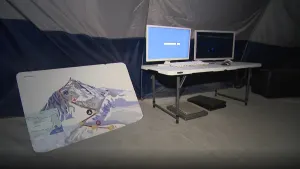Man survives acute pancreatitis scare, doctors warn New Yorkers about the disease
Dr. Braha says the main sign of pancreatitis is severe pain in the abdomen that radiates to the back or shoulder, especially after a meal and lasts for 30 minutes or more.
•
Oct 7, 2022, 11:52 PM
•
Updated 921 days ago
Share:
More Stories
1:31

What's Cooking: Uncle Giuseppe's Marketplace's prime rib roast
111ds ago1:30

Looking for a road trip? Check out Big Snow at American Dream in East Rutherford
307ds ago1:27

What's Cooking: Uncle Giuseppe's quiche lorraine
342ds ago2:34

Guide: Safety tips to help prevent home burglaries
406ds ago2:19

Guide: Safety measures to help prevent fires and how to escape one
554ds ago2:36

Looking for a road trip? Check out Trap Door Escape Room in Red Bank
579ds ago1:31

What's Cooking: Uncle Giuseppe's Marketplace's prime rib roast
111ds ago1:30

Looking for a road trip? Check out Big Snow at American Dream in East Rutherford
307ds ago1:27

What's Cooking: Uncle Giuseppe's quiche lorraine
342ds ago2:34

Guide: Safety tips to help prevent home burglaries
406ds ago2:19

Guide: Safety measures to help prevent fires and how to escape one
554ds ago2:36

Looking for a road trip? Check out Trap Door Escape Room in Red Bank
579ds agoOn the last day of vacationing with his wife in South Carolina, Steve Nuzzo knew something was wrong – but didn’t think anything about it. He then spent 16 days in Mount Sinai Brooklyn hospital.
Nuzzo noticed some mild signs such as heartburn and indigestion. Two days later, the sharp pains in his chest and back became unbearable.
“Honestly, I thought I was gonna die there,” said Steve. “The last thing I remember was being wheeled out to the ambulance…that's about it after that.”
He was eventually diagnosed with severe pancreatitis.
“Pancreatitis is when the pancreas becomes inflamed,” said Jack Braha, chief of gastroenterology at Mount Sinai Brooklyn and the doctor who helped take care of Steve Nuzzo. “It's a terrible pain that patients develop, like a bomb went off in their abdomens.”
Pancreatitis is often caused by gallstones that form in the gallbladder or heavy drinking, but Steve had his gallbladder removed four decades ago and is not a heavy drinker.
Those who have had their gall bladder removed can still form stones in the tube that drains their liver and get pancreatitis, according to Dr. Braha. People with diabetes and cystic fibrosis are also at higher risk of pancreatitis.
Dr. Braha says the main sign of pancreatitis is severe pain in the abdomen that radiates to the back or shoulder, especially after a meal and lasts for 30 minutes or more.
More from News 12
2:31

NTSB finds 'failure' in training before deadly Newark cargo ship fire
0:35

Jersey Proud: Students donate snacks to Rahway hospital
2:15

New Jersey residents consider other options as Real ID deadline approaches

Judge rejects defense that Gaudreau brothers contributed to their deaths by cycling while impaired
1:33

NJ food bank says latest federal budget cuts leaving organization in a predicament
0:37
